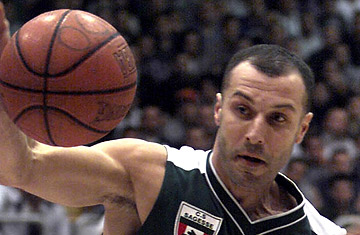
Lebanese basketball player and captain of al-Hikmeh club (La Sagesse) Elie Mshantaf runs with the ball.
Lebanon may be on the brink of another ruinous civil war, but for the country's basketball fans, there are more important things to worry about. Forget the office pools and the social networking for big-game tickets so common in the U.S., particularly during "March Madness"; such is the passion of the Lebanese fans that at their games, riot police and the occasional armored personnel carrier are as common a sight as cheerleaders.
Basketball is Lebanon's most popular sport, and for of a small Middle Eastern country with a population of a mere 4 million, the Lebanese have a surprisingly good game. Lebanon often ranks near the top of the Asian championships, lagging just behind the likes of China (population 1.3 billion). But even on court, the country's toxic brew of sectarianism and politics causes as much excitement as the athletes. All 12 of Lebanon's semi-professional basketball teams have some sort of religious or political affiliation. And despite the fact that fans from rival teams are segregated into stands on opposite sides of the court, fights break out so regularly that the government barred all spectators from league games for a few months last year. Even when there's no violence, games resemble political rallies — with flags, political salutes and the chanting of slogans hailing political leaders — rather than simply sporting events.
And that's a problem, because in Lebanon, politics have a way of turning ugly. The country fought a devastating civil war from 1975 to 1990, mostly along religious lines: Christian vs. Muslim. Today the battle lines are forming once again between, on the one side, Christian and Sunni Muslim groups allied with the U.S.-backed government, and ranged against them, Shi'ite Muslim and Christian groups that form an opposition movement supported by Syria and Iran.
These tensions — heightened by concern over the possibility of another war with Israel — often spill onto the court. Because Lebanon's Shi'ites generally prefer soccer (perhaps reflecting their status as a traditionally disenfranchised minority), the main hoops action tends to be Christian vs. Christian, and Christian vs. Sunni. In fact, basketball is an extension of politics to such a degree that when General Michel Aoun, a Christian leader, turned against the country's mainline pro-government Christians, one of the first things he did was start a new basketball team, the Blue Stars.
Last Friday night at a game hosted by a team from Achrafieyeh, a Christian neighborhood in Beirut, the home crowd shouted: "God, Achrafieyeh and the Doctor!" in reference to a Christian leader who once attended medical school. They also tried to distract a rival player with a gay slur intended to be particularly insulting to Muslims. "Toot, toot, toot! Khaled is a fruit!"
That basketball has become a reflection of the country's disunity is one of Lebanon's sad ironies: The sport was brought here by American missionaries and educators in the early 20th century as part of a Wilsonian nation-building project among the colonized peoples of the Middle East. The hope may have been that sports could help foster the values of a civil society that erased boundaries between Christians and Muslims, East and West, but that never happened. "In Lebanon, we never have progress," said Ellie Fawaz, a legendary Lebanese player who himself was taught basketball by an American missionary. "Instead, we have war."
Still, basketball in Lebanon has had its transcendent moments, such as in 1999 and 2000 when Sagesse, a Christian team, won the Arab club championships two years in a row and the whole country shut down in celebration. And the players here — a mix of locals with a bit of imported American talent — are professionals in the best sense. "It's the opposite of America," said Demetric Shaw, a player visiting Lebanon from Fort Worth, Texas. "Here the fans fight, but the players never do."
The biggest problem facing Lebanese basketball, however, may not be politics, but economics. Even before recent political upheavals, Lebanese teams were having trouble competing with oil-rich teams from the Gulf who have been buying up top players. But Pierre Kakhia, the head of the local basketball federation, has developed a typically Lebanese response to a financial crisis: tap into the vast network of talented people all over the world who have Lebanese ancestry, and lure them back home to the Switzerland of the Middle East. "We're looking abroad for the tallest Lebanese," he said.
